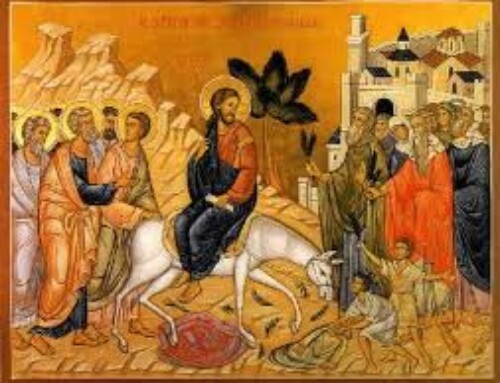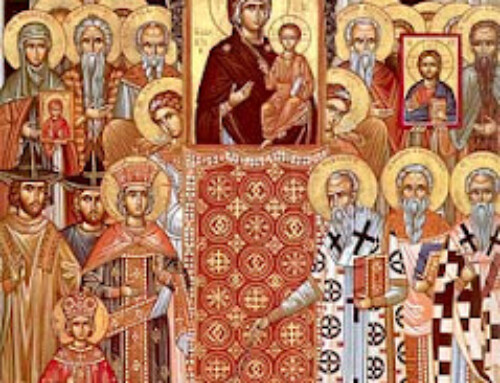Word Magazine April 1999 Page 4-5
LENTEN MESSAGE
ORTHODOX CHRISTIAN PATRIARCHATE OF ANTIOCH AND ALL THE EAST
IGNATIUS IV
PATRIARCH OF ANTIOCH AND ALL THE EAST
BY THE GRACE OF THE MOST HIGH GOD
To our children in the Lord, The Reverend Clergy and the faithful people of true worship
We bestow upon you our paternal blessing invoking wholeheartedly upon you the divine care to protect you all. During this Great Holy Lent we would like to address you with this pastoral letter in which we incorporate our love and supplication. We pray that you may pass this season in peace with yourselves and with the whole creation, and become blamelessly worthy to receive the glorious illumination of the Resurrection.
As we were examining our spiritual condition during the last two meetings of the Holy Synod, it was brought to our attention that even though your awareness and decision to live in Christ has been growing, you often neglect the Sacrament of Confession. Therefore, the Fathers of the Holy Synod deemed it appropriate that I should address you with this paternal message so that we may be able to treat this wound which is beginning to bleed in the body of the Church. When the committed faithful were familiar with this Sacrament, some weak members were complaining about the position and the role of the priest in this sacrament. They raised the question about the meaning of confessing sins to a human being like themselves. Their objection was that God alone has the authority to remit sins. These extreme tendencies have led some of them to refrain from receiving Holy Communion, if it is not preceded by an open confession of sins with which we are afflicted every day. Placing the stole over the head and reading the prayer of absolution on the faithful became their only obligatory path toward the Holy Chalice.
They did not realize that they receive the Eucharist for the forgiveness of sins and that he who sincerely repents in his heart is able to receive the Eucharist. Only in this way will the repentant remain in communion with the Church.
Our people have felt the truth of these divine words: “Unless you eat the flesh of the Son of Man and drink His blood, you have no life in you” (John 6:53). But the collective receiving of the Eucharist does not justify our negligence of the sacrament of repentance. All the sacraments are integrated in one substance. But we have to study the sacrament of repentance by itself, and understand its spirit and position in our pilgrimage to our deliverance from sin.
What is the Biblical foundation of the sacrament of repentance? There is a foregoing foundation for practicing (canonical) confession to the priest, which is the mutual reconciliation between the brethren according to the Lord’s words. “If your brother sins against you, go and tell him his fault between you and him alone. If he hears you, you have gained your brother. And if he refuses to hear them, tell it to the church” (Matthew 18:15-17).
This is an essential introduction to canonical confession. If you do not reconcile with your brother you have no repentance. If your brother refuses the proposition of reconciliation, turn to other faithful for help. If he refuses to hear even from the Church which is the place of loving concurrence, let him be to you like a pagan and a tax collector, i.e., he who does not accept the discipline of the Church breaks away from her. If your brother accepts the reconciliation he will accept the peace of God on him. Who then is the one who forgives? In the miracle of the paralyzed, it was Jesus who said to him: “Man, your sins are forgiven you (Luke 5:20). Thereupon Luke states: “And the scribes and the Pharisees began to reason, saying, ‘Who is this who speaks blasphemies? Who can forgive sins but God alone?’ “ (verse 20). But Jesus affirms saying: “The son of man has power on earth to forgive sins’ (verse 24). Raising the paralyzed he asserts that he (i.e., Christ) has the power to forgive sins. In both canonical and personal confession God alone is the One Who forgives sins. This is assured by the prayer of absolution: “May God who, through Nathan the prophet forgave David when he confessed his sins, and Peter, when he wept bitterly for his denial; and the harlot who shed tears upon his feet; and the Publican; and the prodigal; may the same God forgive you.” When the priest proclaims this forgiveness which comes from above, then divine absolution takes place. The Orthodox priest does not say: “I absolve you” or “I forgive you.”
The repentance of which we speak is not simply a renunciation of some vile actions based on ethical criteria. It is a return to the face of God and an act of worshipping Him in Jesus Christ. It is a personal return to God, to a merciful and compassionate God who embraces you after you have left him, followed other gods and worshiped your passions.
As baptism is not only by water, but implies the change of mind by the Word and the Spirit, so instruction comes by the Word of God at the hand of the bishop or the priest. This makes confession complete and sound. The word will be a renewal to the mind and heart and an incentive not to fall again into the pit of damnation. The prayer of absolution is a proclamation of reconciliation between God and the people. The father confessor says it in the name of the whole Church in whom the confessing person renews his sonship to God. Completing your confession you shall lead a new life as you have promised after your baptism. Here comes the question: “If I keep sinning should I confess after each sin?” The answer: This is not a legal and formal subject to which we should enact laws. Repentance is a situation in which the faithful lives after transgressing and sinning. Your sins against the others will be pardoned if you go to them asking for forgiveness, not just through formal confession in front of a priest. Confession is not a magic absolution of transgressions.
In the light of Church history, we confess, according to this teaching, our transgressions which burdened our conscience. It might be proper to state each and every sin which we have committed. The best method of examining the soul is in remembering the ten commandments, through which we may remember all our transgressions since our last confession. We may also remember the biblical ruling guide: “You shall love the Lord your God . . . You shall love your neighbor as yourself (Matt. 22:37—39). Then we will clearly understand our transgressions, whether in word or deed or thought. We do not mention the names of other people involved, because the priest is not interested in knowing to whom and with whom we have sinned. The main thing is our own spiritual situation. The priest may impose reformative discipline on us, like additional fasting, prostration, repetitive prayers and almsgiving. This is a robust spiritual taming which will be helpful in any serious encounter with new temptation.
In reminding you of the ideals on which the sacrament of repentance is instituted, we want you not to be negligent to that sacrament which reveals how good the Lord is. Our life in the Church is to taste and to know Him as being intimate and dwelling in us, so that we may be renewed through his knowledge. “Until we all come to the unity of the faith and of the knowledge of the son of God, to a perfect man, to the measure of the stature of the fullness of Christ” (Ephesians 4:13). When we are renewed by this knowledge we will join the journey of salvation which He had opened by His Blood and revealed by His Resurrection.
May the grace of the Lord encompass all of you.
IGNATIUS IV
PATRIARCH OF ANTIOCH AND ALL THE EAST
Translated by V Rev. Fr Michel Najim.



